Electronics & Communication Engineering
Department Overview
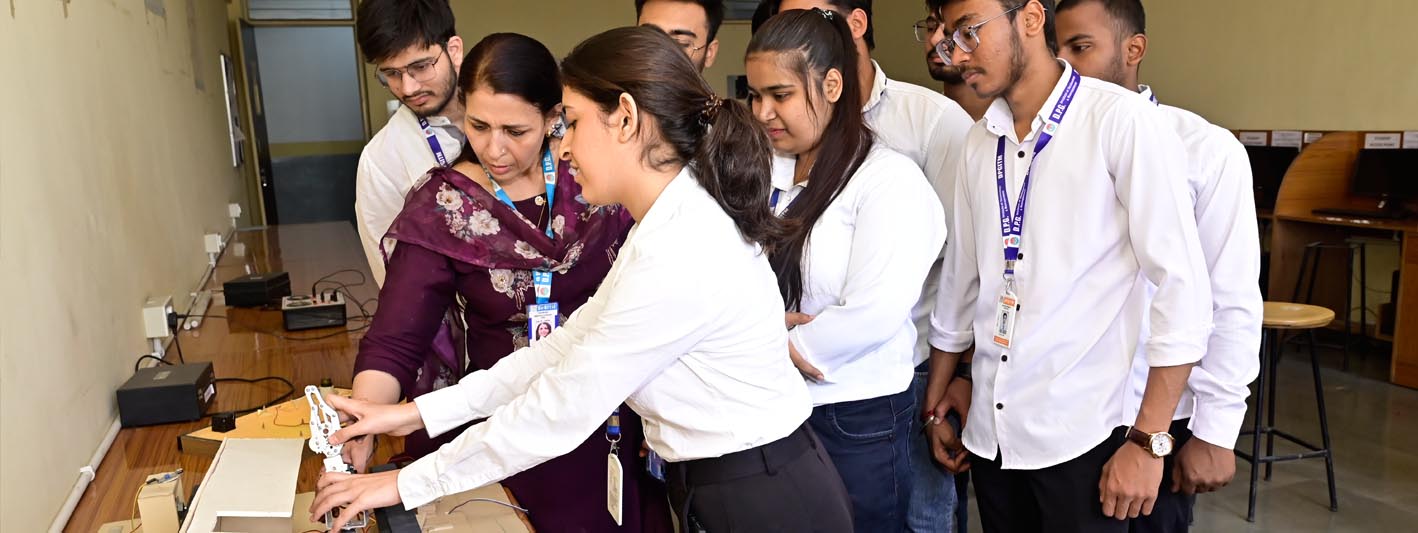
Electronics Engineering is one of the largest and fastest growing field of engineering. It covers a wide range of applications which make our life easier and enjoyable such as Television, Radio, computers, telecommunication etc. They helps us to see, hear and communicate over vast distances and do things faster. Electronics has a major role in improving productivity in industries like oil, energy, agriculture and so many other important sectors of economy. In steel, petroleum and chemical industries it is the electronic devices that direct, control and test production processes. Health care industry depends on electronic instruments to perform chemical tests and to check body functions. The safety in transportation, factories and mines and in homes relies heavily on electronics. The uses are endless.
An Electronics engineer must find new solutions to the practical problems affecting our daily lives. An electronics engineer will work in team with other specialists to design, fabricate, produce, test and supervise the manufacture of complex products and systems i.e. electronic equipments and components for a number of industries including hospitals, computer industry, electronic data processing systems for communication and in defense etc. They supervise production and manufacturing processes and oversee installation and maintenance. Electronics engineers work with devices that use extremely small amounts of power. They work with microprocessors, fiber optics, and in telecommunication, television, radio etc.
Electronics engineering is a constantly changing and widening branch of the engineering profession. Electronics industry being a labour intensive industry provides many job opportunities for the skilled job seekers. Increased production and demand by government and businesses for communication equipment, computers and military electronics along with consumer demand and increased research and development on robots and other types of automation contributes to the growth of employment opportunities in the field. Candidates having a creative and inventive mind and also are good at physics and mathematics will probably find electronics engineering a challenging and lucrative career.
Objectives of the Course
The objectives of the course to equip graduates with the following:- An ability to apply knowledge of mathematics, science and engineering to electronics and communication engineering problems.
- An ability to design and conduct experiments and to analyze and interpret gathered data
- An ability to function in and/or develop leadership in multi-disciplinary teams.
- An ability to identify, formulate and solve electronics and communication engineering Problems
- An understanding of ethical and professional responsibility
- An ability for effective communication
- An ability to understand and correctly interpret the impact of engineering solutions in a social/global context
- An ability to engage in life-long learning to follow developments in electronics and communication engineering
- A knowledge and understanding of contemporary issues
- An ability to skilfully use modern engineering tools and techniques necessary for engineering design, analysis and applications
- A recognition of the need for quality
- An ability to function individually as well as be part of a team
Courses Available
| Sem | Course/Subject | Code | Marks Theory | Marks Sessional | Course Faculty |
|---|---|---|---|---|---|
| 3 | Signals and Systems | PCC-ECE-209-G | 75 | 25 | Dr. Akanksha Kulshreshtha |
| 3 | Electronic Devices | PCC-ECE-210-G | 75 | 25 | Ms. Neha Mathur |
| 3 | Data Structure | PCC-CSE-221-G | 75 | 25 | Ms. Archana |
| 3 | Network theory | PCC-ECE-211-G | 75 | 25 | Ms. Neha Mathur |
| 3 | Economics for Engineers | HSMC-01G | 75 | 25 | Ms. Neeraj |
| 3 | Environmental Science | MC-106G | 75 | 25 | Dr. Rimmi |
| 3 | NT Lab | LC-ECE-212-G | 25 | 25 | Ms. Neha Mathur |
| 3 | PCB workshop | LC-ECE-213G | 50 | 50 | Dr. Akanksha Kulshreshtha |
| 3 | Electronic Devices Lab | LC-ECE203G | 25 | 25 | Ms. Neha Mathur |
| 4 | Digital Electronics | PCC-ECE205G | 75 | 25 | Ms. Gulrukh |
| 4 | Digital Electronics Lab | LC-ECE207G | 25 | 25 | Ms. Gulrukh |
| 4 | Organizational Behaviour | HSMC-02G | 75 | 25 | Dr.Sapna |
| 4 | Analog Circuit | PCC-ECE206G | 75 | 25 | Ms. Neha Mathur |
| 4 | Analog Circuit Lab | LC-ECE-208G | 25 | 25 | Ms. Neha Mathur |
| 4 | Microcontroller | PCC-ECE201G | 75 | 25 | Ms. Vimal |
| 4 | Microcontroller Lab | LC-ECE-214G | 25 | 25 | Ms. Vimal |
| 4 | Communication System | PCC-ECE202G | 75 | 25 | Dr. Akanksha Kulshreshtha |
| 4 | Communication System lab | LC-ECE204G | 25 | 25 | Dr. Akanksha Kulshreshtha |
| 5 | Electromagnetic Waves | PCC-ECE301G | 75 | 25 | Ms. Gulrukh |
| 5 | Linear IC Application | PEC-ECE-313-G | 75 | 25 | Ms. Neha Mathur |
| 5 | Communication Engineering | PCC-ECE-305-G | 75 | 25 | Ms. Vimal |
| 5 | DSP | PCC-ECE-307-G | 75 | 25 | Ms. Akanksha |
| 5 | Computer Organization & Architecture | PCC-ECE303G | 75 | 25 | Ms. Smiriti |
| 5 | Object Oriented Programming with C++ | OEC-ECE317G | 75 | 25 | Ms. Archana |
| 5 | DSP Lab | LC-ECE327G | 25 | 25 | Ms. Akanksha |
| 5 | EM Lab | LC-ECE323G | 25 | 25 | Ms. Gulrukh |
| 6 | Control System | PCC- ECE302G | 75 | 25 | Mr. Devjani |
| 6 | Control System Lab | LC- ECE324G | 25 | 25 | Mr. Devjani |
| 6 | Engineering Ethics | HUM-ECE-306G | 75 | 25 | Ms. Akanksha |
| 6 | Computer Network | PCC-ECE304G | 75 | 25 | Ms. Vimal |
| 6 | Computer Network lab | LC-ECE322G | 25 | 25 | Ms. Vimal |
| 6 | Python Programming | OEC-ECE318G | 75 | 25 | Mr.Mukesh |
| 6 | CMOS Design | PCC-ECE308G | 75 | 25 | Ms. Neha Mathur |
| 6 | VHDL and Digital Design | PEC-ECE312G | 75 | 25 | Dr. Akanksha Kulshreshtha |
| 7 | Mobile Communication and Networks | PEC-ECE-410-G | 75 | 25 | Ms. Akanksha |
| 7 | DCNS | PEC-ECE-411-G | 75 | 25 | Ms. Neha Mathur |
| 7 | Fiber Optic Communication | PCC-ECE-401G | 75 | 25 | Ms. Gulrukh |
| 7 | Antenna and Wave | PCC-ECE-402-G | 75 | 25 | Ms. Akanksha |
| 7 | WSN | PEC-ECE-413-G | 75 | 25 | Ms. Vimal |
| 7 | DCNS Lab | LC-ECE-405-G | 25 | 25 | Ms. Neha Mathur |
| 8 | Microwave Theory & Technique | PCC-ECE-404-G | 75 | 25 | Ms.Vimal |
| 8 | Satellite Communication | PCC-ECE-403-G | 75 | 25 | Ms. Akanksha |
| 8 | Wireless & Satellite Communication Lab | LC-ECE-406-G | 25 | 25 | Ms. Akanksha |
| 8 | Embedded System | PEC-ECE-415-G | 75 | 25 | Ms.Neha |
| 8 | Solid & Hazardous waste Management | OEC-CE-402-G | 75 | 25 | Ms.Rita |
B.Tech. Electronics & Communication
The core objective of the BTech (ECE) program is to equip students with necessary core competency to succeed long-term in engineering/ entrepreneurship careers after completing their B.Tech. and are preparing to undertake PG studies and research as career options. B.Tech. is one of the best course in engineering for students seeking a career in the field of electronics and communication.
Our curriculum is directed to applications in major areas such as telecommunications, energy and electronics sectors, Electrical engineering, embedded programming etc. while encouraging development of necessary skills for integration of hardware and software components. We believe that many creative opportunities exist at the boundaries of traditional CSE and ECE, and have accordingly planned for cross-training of students across disciplinary boundaries.
A palpable excitement surrounds are department of ECE, the enthusiasm pervades in every classroom and lab, invigorating student with innovative ideas. In an age when electronics play a major role in daily life and the promise of nano technology is coming to fruition, it is truly a great time to be a part of ECE. Liaison with industry, major research establishments, and learned societies ensures that courses continue to meet the changing needs of the profession. The department is well equipped with all the gadgets, instruments and software required for experiments. Project work throughout the course underpins the necessity for a combination of practical and theoretical skills and abilities. The department provides six weeks summer training program on embedded system to give the students comprehensive theoretical and practical background so that they are constantly aware of the rapid changes talking place in the world of technology.
Labs :
- Elements of Electronics
- Electrical Technology
- Digital Electronics
- Digital Communication
- VHDL
- Electronics Design
- MP & I
- Microwave , Project
- EMEC
- Advance Data Communication Advance DSP (Digital Data Processing)
Faculty

Dr. Sonu Rana
Head of Department
Electronics & Communication Engineering
Dr. Sonu Rana
- Ph.D. in Electronics and Communication Engineering
- Experience: 16.5 Years
- Mail Id: head.eced@dpgitm.ac.in
Dr. Sonu Rana is an accomplished academician with over 16 years of extensive experience in teaching, research, and administration. Currently serving as the Head of the Electronics and Communication Engineering (ECE) Department at DPGITM, Gurgaon, Dr. Rana has demonstrated a consistent commitment to fostering academic excellence and technological innovation. Her expertise lies in the fields of Design and Analysis of Planar Microstrip Antennas for 5G and IoT Applications. Dr. Rana has authored numerous research papers in reputed SCI, Scopus, and IEEE journals. Her research contributions include the design and analysis of antennas for modern wireless applications, machine learning applications in engineering, and IoT-driven solutions for societal challenges.
Academic Contributions
- Published 2 SCI papers and 2 Scopus-indexed papers in reputed journals.
- Presented research findings at prestigious IEEE conferences.
- Supervised numerous undergraduate and postgraduate student projects.
- Actively involved in curriculum design, mentoring, and fostering research collaborations.
Patents
- System and Method for Crop and Fertilizer Recommendation using Cyber Physical System and Machine Learning.
- AI and IoT-based Smart Urban Waste Management System for optimal resource allocation.
Professional Engagements: Dr. Rana has actively contributed to the academic community by participating in faculty development programs, technical workshops, and conferences. Her leadership experience includes serving as the Head of the Examination Cell, Head of the Cultural Activity Cell, Sports Coordinator, and organizer of various academic events.
Teaching Expertise
- Wireless Communication
- Digital Electronics
- Microprocessors and Interfacing
- Control Systems Engineering
- Satellite Communication Engineering
For further information or research collaboration inquiries, feel free to reach out via email at head.eced@dpgitm.ac.in
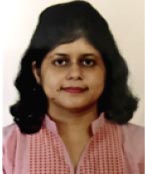
Dr Akanksha kulshreshtha
HoD, Assistant Professor
Electronics & Communication Engineering
Dr Akanksha kulshreshtha
- B.Tech, M.Tech, PhD
- Journal papers: 10
- Area of interest: Image segmentation, deep learning in image processing, image filtering and reconstruction, CNN models in MRI images etc.
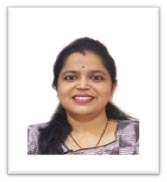
Neha Mathur
Assistant Professor
Electronics & Communication Engineering
Neha Mathur
- Ph.D.(Pursuing), B.Tech., M.Tech.
- Journal papers: 10
- Area of interest: VLSI systems for Low Power Design Application, VLSI Architectures and Digital Arithmetic etc.
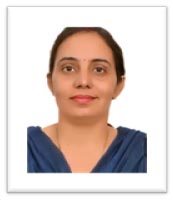
Vimal
Assistant Professor
Electronics & Communication Engineering
Vimal
- B.Tech, M.Tech
- Journal papers: 4
- Area of interest: Digital electronics, Wireless communication and microprocessor etc.
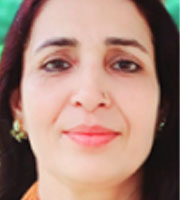
Gulrukh Shahab
Assistant Professor
Electronics & Communication Engineering
Gulrukh Shahab
- B.Tech. M.Tech.
- Journal papers: 4
- Area of interest: Digital electronics, Wireless communication and microprocessor etc.
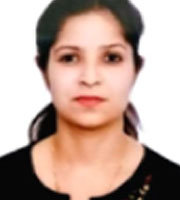
Rashmi Wadhwa
Assistant Professor
Department of Computer Science Engineering
Rashmi Wadhwa
- B.Tech. M.Tech.
- Journal papers: 4
- Area of interest: Digital electronics, Communication system, Control system and electronic devices and circuits.
Vision & Mission
Vision
To produce creative, innovative and skilled Electronics & Communication Engineer with ethical integrity, morality and technical focus to meet socio- economic needs.
Mission
- Establish a unique learning & teaching process to provide deep knowledge to prepare the students to face the challenges of Electronics & Communication field.
- Enable student to develop skill to solve complex technological problems through innovations and group learning experiences which enhance the skills, leadership quality and employability.
- To inculcate self-learning attitude through experiential learning process and to imbibe the spirit of responsible professionalism by making the students technically sound.
- To provide a creative, motivating and innovative environment for student’s technical, social and ethical development.
PEOs, PO’s and PSOs
1. Engineering knowledge:
Apply the knowledge of mathematics, science, engineering fundamentals, and an engineering specialization to the solution of complex engineering problems.
2. Problem analysis:
Identify, formulate, review research literature, and analyze complex engineering problems reaching substantiated conclusions using first principles of mathematics, natural sciences, and engineering sciences.
3. Design/development of solutions
Design solutions for complex engineering problems and design system components or processes that meet the specified needs with appropriate consideration for the public health and safety, and the cultural, societal, and environmental considerations.
4. Conduct investigations of complex problems
Use research-based knowledge and research methods including design of experiments, analysis and interpretation of data, and synthesis of the information to provide valid conclusions.
5. Modern tool usage:
Create, select, and apply appropriate techniques, resources, and modern engineering and IT tools including prediction and modeling to complex engineering activities with an understanding of the limitations.
6. The engineer and society:
Apply reasoning informed by the contextual knowledge to assess societal, health, safety, legal and cultural issues and the consequent responsibilities relevant to the professional engineering practice.
7. Environment and sustainability
Understand the impact of the professional engineering solutions in societal and environmental contexts, and demonstrate the knowledge of, and need for sustainable development.
8. Ethics
Apply ethical principles and commit to professional ethics and responsibilities and norms of the engineering practice.
9. Individual and team work
Function effectively as an individual, and as a member or leader in diverse teams, and in multidisciplinary settings
10. Communication
Communicate effectively on complex engineering activities with the engineering community and with society at large, such as, being able to comprehend and write effective reports and design documentation, make effective presentations, and give and receive clear instructions.
11. Project management and finance
Demonstrate knowledge and understanding of the engineering and management principles and apply these to one’s own work, as a member and leader in a team, to manage projects and in multidisciplinary environments.
12. Life-long learning
Recognize the need for, and have the preparation and ability to engage in independent and life-long learning in the broadest context of technological change
Program Specific Outcomes (PSOs):
- PSO1: The students will be able to apply the concepts of Electronics & Communication Engineering to design and implement complex systems in the areas related to Analog and Digital Electronics, VLSI, Signal processing, Embedded systems and Communication.
- PSO2: The students will be able to apply the acquired technical knowledge for successful career and to qualify the competitive examinations at the National level and Global level.
- PSO3: The students will be able to contribute to the society as an responsible Electronics & Communication engineer by using his/ her technical knowledge, leadership quality, management skills, ethical and moral values.
Labs. & Infrastructure
COMMUNICATION SYSTEM LAB
Communication System laboratory focuses on training the students in both analog and digital transmission/reception of signal. The students here start in the analog area by constructing the circuits of amplitude modulation, frequency modulation and phase modulation. Learning the concepts, with small applications give them plenty of joy and real motivation towards their studies.
DIGITAL ELECTRONICS LAB
Digital Electronics lab is special and well equipped with the latest signal generators, oscilloscopes,digital trainer kits and measuring instruments.Students of various branches design and test their analog/digital/mixed signals,digital circuits as part of their curriculum. Guidance is provided to the students by a team of expert faculty and lab technicians.The labs are kept open after the college hours to enable the students to engage themselves in designing /testing the circuits in their leisure hours. Students are grouped into small teams and guided to do their mini projects by using the facility mentioned below.
ANALOG ELECTRONICS LAB
The objective of this laboratory is to link the theoretical concepts of different analog electronics circuits with practical feasibility thereby giving them a scope to learn basic electronics circuits and their different electrical characteristics in a better way.
MICROCONTROLLER LAB
In this lab, students will learn about the performance microprocessor and also master on assembly level language. Students will also understand the concept of peripheral devices and observe its performance and evaluate their performance accordingly.
COMPUTER NETWORK LAB
This lab is dedicated for students to work on practical experiments, projects and research work related to courses such as Computer Networks, Wireless Networks, Mobile Communications, Software-Defined Networking, Internet of Things, Future Networks (5G) and Cloud Computing.
MINI PROJECT LAB
Project lab aims to enable the students to get familiar and experience various electronics and electrical hardware tools through hands-on mode. Here students learn to work with basic circuit designing equipment like soldering iron, drilling machine, component selection and mounting and will end this lab in a project module. This lab is also about testing the circuits, troubleshooting the working errors and studying their computational complexities. Developing the solid foundations in the basic concepts of electronics and electronics components, their specification and circuit designing.
WIRELESS AND SATELLITE COMMUNICATION LAB
In WSC Lab the students gets the chance to understand the concept of uplinking and downlinking by using the digital satellite communication trainer kits and use the link for speech and image signal transmission. The CDMA trainer kits gives better understanding of multiplexing to student. Wireless transmission concepts correlates with hands-on practical sessions.
DATA COMMUNICATION LAB
The Data Comm. Lab provides the practical implementation knowledge of different types of networks, their architectures, and topologies. Also the knowledge about different types of switches, routers, connectors etc. are used to share in lab sessions.
DIGITAL SIGNAL PROCESSING LAB
The Digital Signal Processing applications are becoming more prevalent in every day use. The field of DSP was developed due to the flexibility offered by the use of digital computers in implementing signal processing algorithms and systems. The students enrich their knowledge by using the software tools OF MATLAB
NETWORKS LAB
This lab consists of various type of instruments which helps the student to understand electrical network problem solving methods experimentally. Kits for understanding the network laws and theories also gives practical understanding to the students.
ELECTRIC DRIVES LAB
In this lab experimental setups on which students of final year perform experiments related to topics studied in electric drives like speed control of d.c. motor, speed control of a.c. motor, etc. The students enjoys the demonstration of working of basic electronic devices which they use in their day to day life.
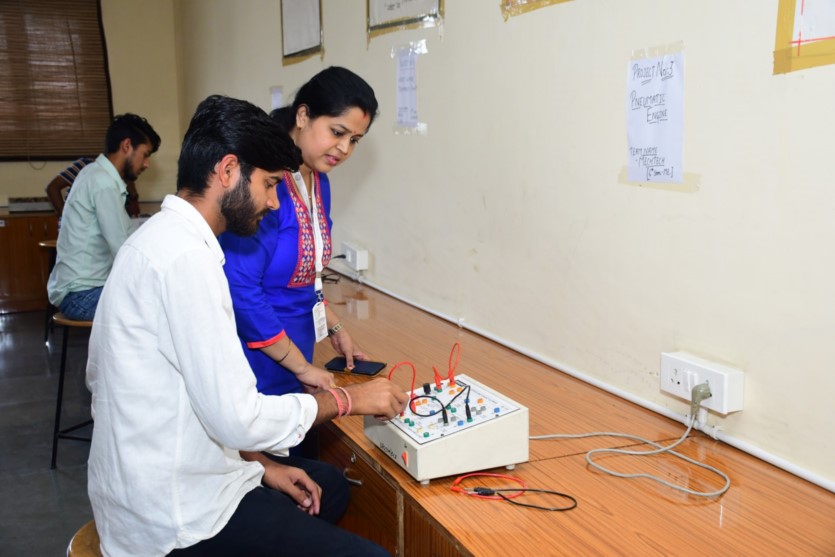
DIGITAL ELECTRONICS LAB
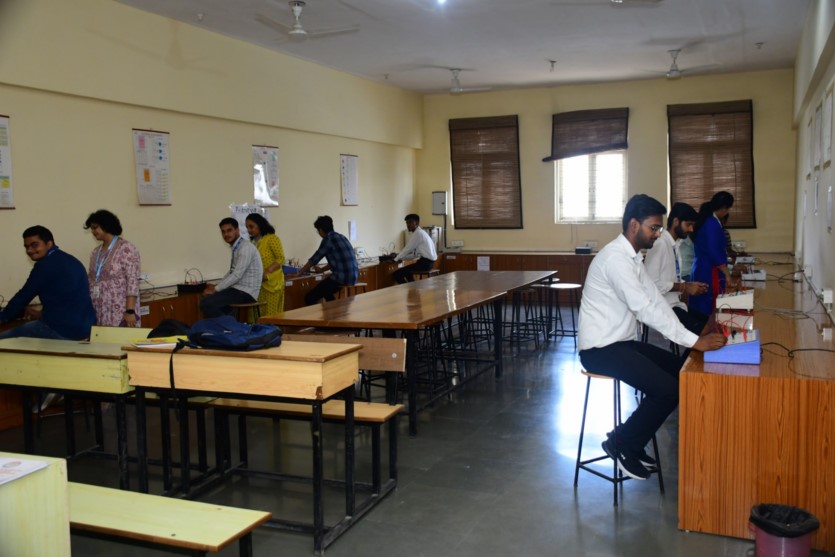
ANALOG ELECTRONICS LAB
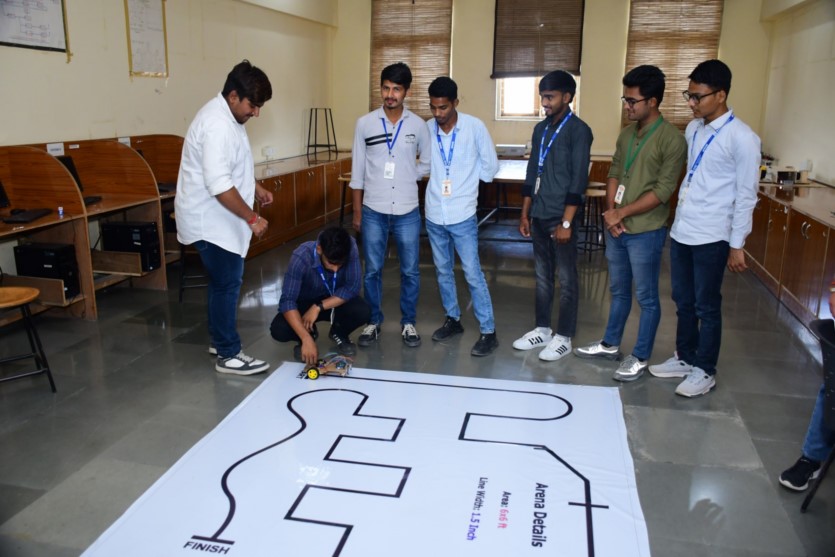
MICROCONTROLLER LAB
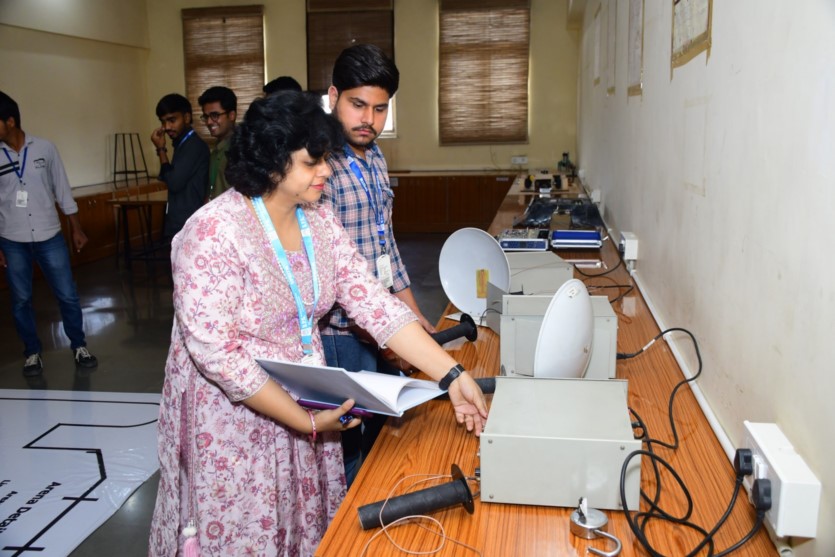
WIRELESS AND SATELLITE COMMUNICATION LAB
Employment Opportunities
- Hardware Design Engineer: Applications ranging from consumer electronics to industrial machinery
- Embedded Systems Engineer: Applications such as automotive electronics, medical devices, IoT devices, and industrial automation.
- Analog and Digital Circuit Designer: Applications in signal processing circuits, microcontroller-based systems, communication interfaces, and power electronics.
- Test and Validation Engineer: They often work with testing equipment and data analysis tools.
- Research and Development Engineer: Innovative projects to develop new technologies, improve existing products, and explore emerging trends in electronics and related fields.
- Quality Assurance Engineer: Ensures the reliability, durability, and performance of electronic products through testing, inspection, and adherence to quality standards and regulations.
- Entrepreneur/Startup Founder: Start their own businesses or join startups, developing new products or technologies based on their expertise in electronics.
Clubs
Electronic Students Technical Association( A technical step towards society)
- Aiming towards betterment of technical education
- Formed on 23-01-2019
- For Students—–By Students ——of Students
- Event conduction under ESTA
- Feel of leadership and team making
- All the Faculty members and students of ECE Department are involved in coordinating and conducting the events under ESTA
Faculty
- Dr Akanksha Kulshreshtha
- Neha Mathur
Student Coordinators
- Abhishek (VI Sem ECE)- President
- Alfiya(VIII-Sem ECE)-Vice President
Syllabus and Scheme of Study
Previous Year’s Question Papers
ECE 3rd Sem
| Title | Download |
|---|---|
| Signal and Systems Feb 2022 | Download |
| Network Theory Feb 2022 | Download |
| Digital Electronics Feb 2022 | Download |
| Electronic Devices Dec 2022 | Download |
| Signal and Systems Dec 2022 | Download |
ECE 5th Sem
| Title | Download |
|---|---|
| Electromagnetic Waves Dec 2022 | Download |
| Communication Engineering Mar 2021 | Download |
| Digital Signal Processing Feb 2022 | Download |
| Linear Applications Mar 2021 | Download |
ECE 7th Sem
| Title | Download |
|---|---|
| Fiber Optical Feb 2022 | Download |
| Mobile Communication and Network Feb 2022 | Download |
| Wireless Sensor Networks Feb 2022 | Download |
| Antenna and Wave Propagation Feb 2022 | Download |
| Data Communication Networking and Security Feb 2022 | Download |
ECE 4th Sem
| Title | Download |
|---|---|
| Engineering Economics May 2023 | Download |
| Analog Circuits May 2023 | Download |
| Communication System May 2023 | Download |
| Digital Electronics May 2023 | Download |
| Electromagnatic Fields May 2023 | Download |
| Microcontrollers May 2023 | Download |
| Signals & Systems May 2023 | Download |
ECE 6th Sem
| Title | Download |
|---|---|
| CMOS Design May 2023 | Download |
| Computer Network May 2023 | Download |
| Control Systems May 2023 | Download |
| Ethics May 2023 | Download |
| Electronics Design Laboratory May 2023 | Download |
ECE 8th Sem
Department Results and Toppers
Department of Electronics & Communication Engineering(ECE) May – 2024
| S.No | Name of the Subject | Course Code | Name of the topper | Marks obtained |
|---|---|---|---|---|
| 1 | Satellite Communication | PCC-ECE-403G | Abhishek | 63 |
| 2 | Microwave Theory & Technique | PCC-ECE-404G | Ankita | 74 |
| 3 | Embedded Syatem | PEC-ECE-415G | Abhishek | 69 |
| 4 | Solid & hazardous waste Management | PEC-ECE-411G | Abhishek | 74 |
Departmental Magazine
| Title | Download |
|---|---|
| ECE Magazine | Download |
